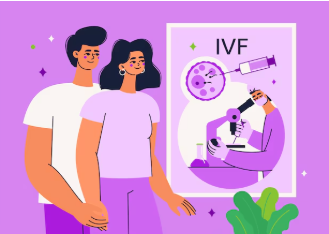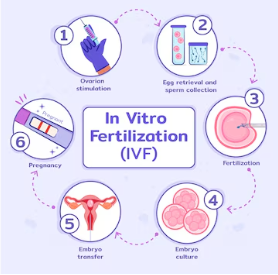By : Geraldus Sigap

Difficulty getting pregnant is not the end of the road. Thanks to advancements in reproductive technology, couples facing fertility issues now have great hope through IVF (In Vitro Fertilization).
What Is IVF (In Vitro Fertilization)?
IVF is a medical procedure in which an egg and sperm are combined outside the body, specifically in a laboratory. After fertilization occurs, the resulting embryo is implanted back into the woman’s uterus. This procedure has helped millions of couples around the world have children.
When Should You Consider IVF?
IVF is generally considered after a couple has tried to conceive naturally for at least one year without success (or 6 months if the woman is over 35). Before jumping to IVF, it’s important to undergo a full fertility diagnostic workup to identify the underlying cause of infertility. IVF may be recommended if:
- Ovulation disorders or poor egg quality are diagnosed
- There is a blockage or damage in the fallopian tubes
- Endometriosis is present
- The male partner has azoospermia (no sperm production) or an ejaculatory disorder that prevents sperm from reaching the egg naturall
Maternal age is above 35 - Previous insemination attempts have failed
- The infertility is unexplained after full evaluation
IVF Process: Step-by-Step
- Ovarian Stimulation – Hormonal medication is given to stimulate multiple egg production in one cycle.
- Egg Retrieval (Ovum Pick-Up) – A minimally invasive procedure using ultrasound guidance.
- Laboratory Fertilization – Eggs and sperm are combined for fertilization.
- Embryo Culture – The developing embryos are observed for a few days.
- Embryo Transfer – The best embryo is transferred into the uterus.
- Pregnancy Test – Done about 10–14 days after embryo transfer.

IVF Success Rates: What to Expect
Success rates vary depending on age, embryo quality, and other medical conditions. Generally:
- Women under 35: 40–50% success rate
- Age 35–37: around 30–40%
- Over 40: less than 20%
It is important to understand that IVF is not a guaranteed solution. While it offers hope, couples should avoid having overly high expectations. The success of IVF depends on multiple factors including age, hormonal profile, sperm and egg quality, and underlying medical conditions. It may take more than one cycle to achieve pregnancy, and emotional preparedness is just as important as physical readiness.
Side Effects & Risks
While generally safe, IVF may carry some risks, such as:
- Ovarian Hyperstimulation Syndrome (OHSS)
- Multiple pregnancy
- Miscarriage
- Emotional stress and high cost
IVF at RS Abdi Waluyo
Supported by experienced fertility specialists and advanced laboratory technology, we are ready to assist you through every stage of the IVF journey with a personal and compassionate approach. Consult your pregnancy plans by contacting the Obstetrics & Gynecology team at RS Abdi Waluyo at 021-3144989 or book an appointment online now.
FAQ
- What is an IVF program?
IVF is a procedure that helps couples conceive by fertilizing an egg outside the body and transferring the embryo into the uterus.
- Who should consider IVF?
Couples with fertility issues such as ovulation problems, blocked tubes, endometriosis, poor sperm quality, or maternal age >35.
- How long does the IVF process take?
Usually around 4–6 weeks from hormone stimulation to embryo transfer and pregnancy testing.
- Is IVF painful?
It is typically done under mild anesthesia and does not cause significant pain. Side effects are usually mild, like bloating or discomfort.
- Are IVF success rates high?
It depends on age and medical factors, but the average success rate is 30–50% for women under 35.
Resource :
- Windfuhr JP, Toepfner N, Steffen G, Waldfahrer F, Berner R. Clinical practice guideline: tonsillitis I. Diagnostics and nonsurgical management. Eur Arch Otorhinolaryngol. 2020 Feb;277(2):505–17. doi:10.1007/s00405-020-05938-7. Available from: https://pubmed.ncbi.nlm.nih.gov/32965937/
- Shaikh N, Swaminathan M, Tessler-Sherman B, Hoberman A. Association of antibiotic treatment with outcomes in children with acute sinusitis: a systematic review and meta-analysis. JAMA. 2022 Jan 18;327(3):224–33. doi:10.1001/jama.2021.23287. Available from: https://www.ncbi.nlm.nih.gov/pmc/articles/PMC8722744/
- Burton MJ, Glasziou PP. Tonsillitis. BMJ Clin Evid. 2014 Jul 22;2014:1505. Available from: https://www.ncbi.nlm.nih.gov/pmc/articles/PMC6140213/
